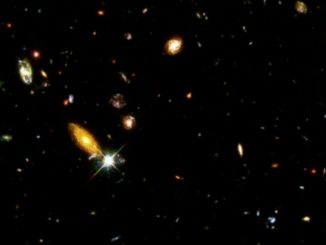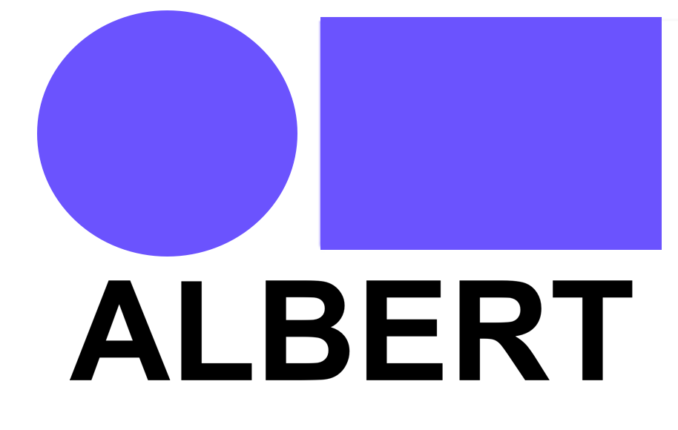
Current Albert,
Kapeesh92 – Licence CC BY-SA 4.0
End of the old endboards
Gone are the days when television programmes finished with a caption proclaiming ‘Granada, From The North’ or a plummy continuity announcer saying, ‘Mike Yarwood is appearing in summer season in Bournemouth.’ Friendly police officers no longer salute and wish viewers ‘Goodnight all’ as the credits roll. These days an increasing number of TV programme endboards show a picture of the underneath of a foot accompanied by the caption ‘Albert Sustainable Production.’ This begs the question, who is this Albert? What is he up to and what is a sustainable production?
Albert is an environmental organisation focused on reducing the carbon footprint of the TV and film production industry. Established as a BBC project, it is now part of BAFTA, the British Academy of Film and Television, of which The Prince of Wales is president. At the moment, all BBC, ITV, Channel 4, UKTV, Sky and Netflix productions in the UK are required to register their carbon footprint using the Albert carbon calculator.
Not only that, at the BBC, Albert certification is mandatory for all new commissions and recommissions of TV broadcast programmes including content from Television, the Nations, Children’s and Education, BBC Film and non-news related sport. And that’s not all. In a process that would make a Borgia Prince paying a medieval Pope to avoid Hell after marrying his own daughter blush, boxes can be ticked which certify the energy and resources-guzzling broadcasting industry to be kind to the environment.
Who’s in charge of Albert?
So who’s in charge of Albert? Based in BAFTA HQ at 195 Piccadilly Circus in London’s West End, Albert’s specialities are sustainability, carbon counting, TV production, film production and environment. The present managing director is Matt Scarff, a senior creative leader who specializes in operations management and process improvement. Matt helps ‘creative, production and media teams thrive in today’s competitive and fast-paced landscape by optimizing their workflows, budgets and strategies.’
What’s more, his role encompasses ‘shaping breakthrough strategies, optimizing digital assets and fortifying industry relationships.’ While doing so, Matt hasn’t had time to find out much about the environment or climate, rather he makes the most of his HND in Broadcast Journalism.
After sixth form college in Cheltenham and completing the HND at West Surrey College of Art and Design, Matt embarked on a media career. This took him from being a local radio reporter in Hong Kong to the BBC, Sky and ITV, where he specialised in marketing and branding. In 2021 Matt took time out to become an ICF-accredited coach on a training programme that instructed in mentoring, Neuro Linguistic Programming (NLP), timeline therapy and hypnosis.
With his newfound skills, he set up Matt Scarff Consultancy Career Coaching before plonking his knees beneath the table at BAFTA last October. His predecessor, Carys Taylor, re-tasked to Director of Climate Content but left Albert to become National Grid’s, External Affairs Head of Wales. Again on the PR side rather than a scientific or climate-based role.
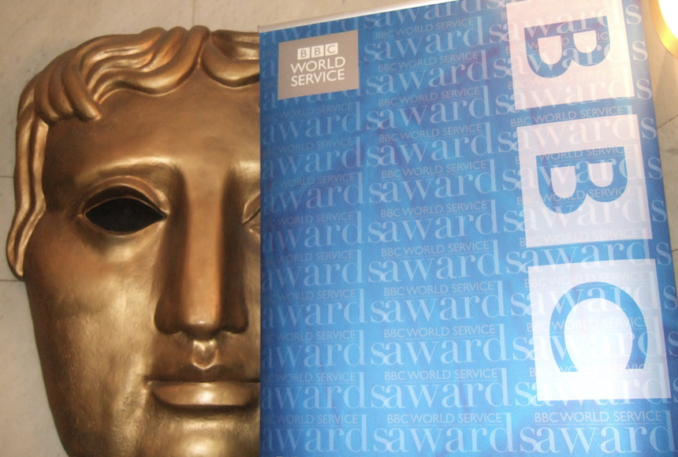
BBC BAFTA banner,
Ben Sutherland – Licence CC BY-SA 2.0
As a student, Carys took a baccalaureate at Llandudno College before embarking on a politics degree at Aberystwyth University sandwiched around two years at the University of Victoria in Canada’s British Columbia. After completing her education she worked at the Job Centre and as an employment advisor before becoming a parliamentary assistant in the House of Commons. Then she moved sideways to the BBC, in Public Relations, thence to decarbonization PR at the National Grid and to BAFTA Albert.
Again without a background in science or climate, the suspicion arises Albert is a bureaucratic public relations Frankenstein’s monster, or even an NLP exercise, to make excuses for the energy-hungry high-profile television industry which, from its high horse in London, preaches at us about energy usage.
The Albert accreditation process
To achieve accreditation, programme-makers must:
- Complete an Albert carbon footprint to measure their emissions
- Develop a carbon action plan to reduce emissions
- Provide evidence of actions taken
- Offset any residual emissions not eliminated
The carbon footprint and action plan must be discussed with BBC commissioning representatives as part of the commissioning process. Producers are encouraged to include a line for sustainability in their budgets. As for the offsetting, this should be calculated at £10.50p per ton of carbon dioxide emitted. Senior members of a production team must lead on environmental sustainability. The process should begin as early as possible and the carbon action plan must be submitted before filming starts. Failure to do so risks certification. Content producers new to all of this must start by signing up for an Albert company account to be provided with logins for their staff.
In order to save the planet one feels obliged. For some bizarre reason Going-Postal isn’t listed in the thousands of companies available from the drop-down application list. Using my initiative I clicked on the ‘Company not listed’ box and declared myself an admin, and ourselves a production company. Which all of us are, as together you and I produce articles and comments.
My request forwarded to an administrator. If approved, an account will be created and a login sent. Albert emailed me back to say my request is being reviewed and I will be notified if our account is approved. Hope they don’t read the comments! I will keep Puffins posted.
The carbon footprint calculator
Without an account, I can’t fill in the carbon footprint form but the BBC inform me that requires the input of data such as production travel, accommodation, energy use in studios or on location, staffing and time in post-production. Of course, programme producers have to make these calculations before being able to type in it and you, the licence fee payer, are paying for it.
Ominously, filling in the form early will help when discussing sustainability plans with the BBC commissioning representative. The BBC also advise updating the carbon footprint disclosure during the production process or collecting data throughout and typing it in at the end. Having completed the carbon footprint form it must be checked and approved by the company’s nominated Albert reviewer for accuracy and directed to an external auditor for an assurance review.
Once audited and approved, a Final Carbon Footprint Approval email will be issued which must be forwarded to the programme maker’s BBC delivery contact. Phew! But more hoops stand in line.
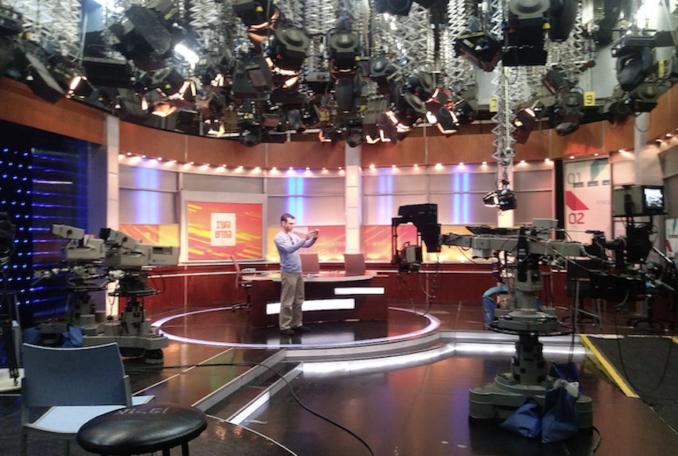
A studio in the Israeli Educational Television,
Danny-w – Licence CC BY-SA 2.0
Carbon Action Plan
Before a project can be ‘green lit’, a carbon action plan must be sent to the BBC. This begins with a series of yes/no questions which should be considered and answered based on what the senior team considers to be achievable actions. Domestic flights within the UK are forbidden. While you enjoy Question Time from Inverness, keep in mind La Bruce made the 444-mile eight-and-a-half-hour trip from Islington to the Capital of The Highlands on the train.
During the production process evidence must be sent to Albert. A shared green evidence folder should be maintained. A completed online carbon action plan questionnaire must be submitted before filming begins. Albert will respond with a request for evidence of the decarbonisation actions taken.
A case study on the Albert website shows the BBC’s Springwatch outdoor broadcast claiming to be powered by hydrogen instead of by a diesel generator. An accompanying graphic shows the hydrogen being produced through an electrolyzer and taken in liquid form by van to a hydrogen power unit on site. This uses the hydrogen to generate electricity for the adjacent BBC Studios outside broadcast vans. The process looks so expensive and complicated the suspicion arises of no net benefit to the environment.
As an aside, Springwatch presenter Gillian Burke will be on the programme because of her sex and colour, with race and gender being as carefully contrived by the BBBC as environmental issues.
The BBC is also committed to Albert’s Climate Content Pledge, which is meant to impact audiences to pro-environmental behaviour. According to the BBC’s own submissions, this can be explicit or implicit. Explicit means content containing environmental themes, such as the Earthshot Awards, with implicit meaning near-subliminal suggestion. An example of the latter given by the BBC shows the camera panning across a hillside in the thriller Happy Valley to show a wind farm in the distance.
Remember, the lead Happy Valley character, Catherine Cawood (Sarah Lancaster) is female, divorced and a police sergeant not because of storyline or characterisation but because of other societal and gender content pledges the BBC has committed to.
Offsetting through Ecoligi
Which brings us to offsetting. Any remaining carbon footprint must be offset at a rate of £10.50 per ton of carbon dioxide emitted. These are paid through Albert’s Creative Offsets, a scheme (scam?) that purchases carbon credits to compensate for greenhouse gas emissions released into the atmosphere. Each carbon credit represents one ton of carbon dioxide equivalent to be reduced by a verified project.
The Creative Offsets scheme is administered by Ecologi, who BAFTA Albert claims is the UK’s leading climate action platform. Albert assures us the projects selected by Ecologi are all verified to Gold Standard or Verified Carbon Standard. However, Ecolgi is not a charity or NGO but a private company which does not publish audited accounts. What information is available at Companies House shows Ecologi to be a multi-million-pound turnover company, employing 60 staff, who, in the interests of saving the planet, offer five-figure interest-free open loans to their directors. Ecologi is the brainchild of Elliot Alexander Coad and his wife Lucy Phillippa Amanda Coad.
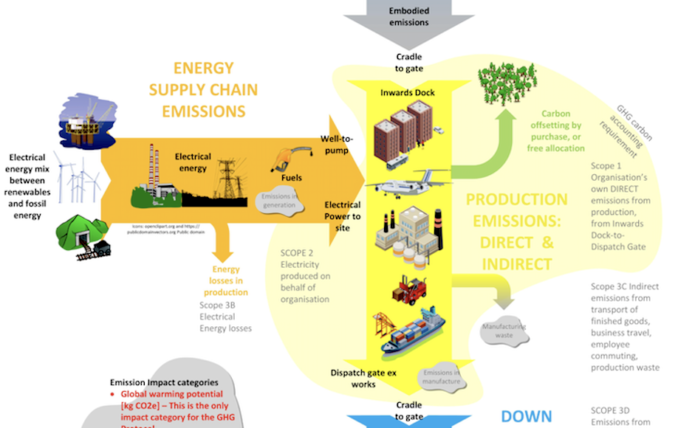
Life cycle analysis and GHG carbon accounting,
John Pons – Public domain
As we’ve come to expect, Eliot doesn’t have a background in climate or science but in computing and web design. Eliot graduated from Bournemouth University with a BSc in Computing. During those studies, he specialised in Advanced Development, Web Systems and Digital Games and Entertainment. After leaving university the thirty-eight-year-old worked for, amongst others, web designers to mainstream media company Clock Limited. In 2019 he set up Ecologi as a web-based CO2 emissions calculator which developed into an emissions reduction and carbon offset business.
More recently the company held investment rounds during which more shares have been issued and more funding invited. These investments have come from pension funds and ‘previous technology company profits.’ The suspicion is that the previous profits were generated by hydrocarbon companies now using Ecolgi, as broadcasters are, to greenwash their operations. Having been in the right place at the right time with his CO2 emissions website, Eliot is candid about his plans, claiming he hopes to cash in when Ecoligi is sold to a major sustainability company or floated on the stock market.
Gaining certification
After completing the carbon footprint and carbon action plans and paying for the offsetting, the application will be assessed by Albert based on how many of the agreed actions will be implemented, the quality of the evidence provided and the level of sustainability achieved. This is indicated by a star rating of between one and three.
As for monitoring accredited content, one method is through programme subtitles which are used to count how often keywords are used. As if an Orwellian ministry, accountants at Deloitte analyse subtitle word frequency across a range of sustainability themes and comparators. In 2020 the BBC sent over 299,000 programme subtitle files to Deloittes for analysis.
All being well, necessary hoops will be jumped through and the Albert logo can appear at the end of the programme. Thus allowing the luvvies to remain holier-than-thou, and the offsetters and PR wallahs at the greenwashing Abertstein bureaucratic monster, to laugh all the way to the bank.
Stop Press
Email from Michael at 195 Picadilly wanting to know what primary content Going-Postal produces and asking for a copy of our company logo. I’ll keep you posted!
© Always Worth Saying 2024

